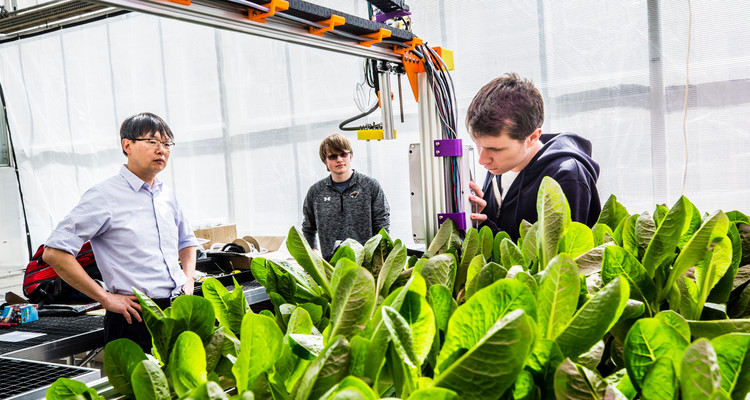Senior Andrew Ryan pointed to different parts of the FarmBot and rover systems he helped build in the St. Thomas Owens Science Hall greenhouse and Facilities and Design Center, and wished for more time.
“There’s always so much more I want to do,” Ryan said. “And so little time.”
Despite his lament, Ryan has been working on the ongoing project up to 40 hours a week this summer. He started with the School of Engineering’s Precision Agriculture Research Team in November, working 10 hours a week.
“It’s really nice working full time. I was thinking a lot throughout the [spring] semester that it would be really nice to be able to focus on just this one thing, and with only 10 hours a week you can only really touch on certain things,” Ryan said. “These things take a lot of time to do.”
“These things” involve developing autonomous, smart rovers to support the world’s growing agriculture needs, and many students and faculty across the Engineering, Biology, Chemistry and Physics departments are contributing to the project.
“I really like where the project is going, the idea behind it. I see the need for it,” Ryan said. “If we can improve our agriculture it’s going to help with a lot of problems. It’s a really cool project and I’m excited to be part of it.”
During his two-plus years at St. Thomas, engineering professor Cheol-Hong Min said he has seen the immense value of students contributing to ongoing research at the university, especially with such a large project as this.
“It’s just a tremendous help. They learn while working on this type of large-scale project the process of how we actually work and do research, and do engineering at companies. They learn and we work with the students, guiding them through the whole process. As a result they become better engineers,” he said. “They have the skills, now they’re learning new tools and implementing things. As they go out and research different types of products or implementing things, they also bring new information back to us in a weekly group meeting. There are 12, 13 people in there each week, throwing ideas together. The students do a great deal moving this project forward.”
Ryan has contributed specifically by working with the electrical needs of the physical objects themselves, everything from designing, building and installing a port for the rover's microprocessor, to wiring different aspects of the unit. He also built the actual FarmBot system in the greenhouse with pro bono engineering consultant and principal of Prescription Robotics Scott Morgan; so, Ryan gained valuable experience working alongside a mechanical engineering professional. Finally, Ryan also is supporting fellow student worker sophomore Peter Farley on software development. Throughout this, Ryan has seen his own skills grow alongside the project.
“I just recently looked back at some of the first things I did on the project, and I just want to throw them out. It’s amazing to see the progress,” he said. “If I can stick with something like this, because I know it so well now, it will be great to help make it as perfect as I can [before graduating]. I’m glad I have some time to do that.”







